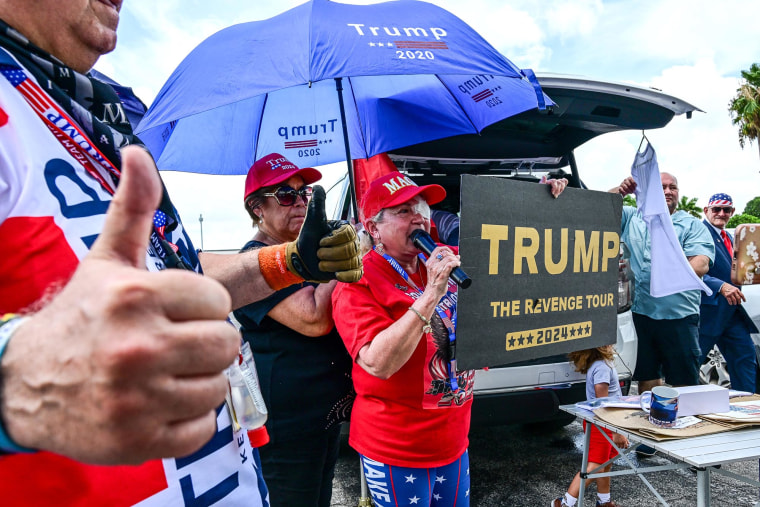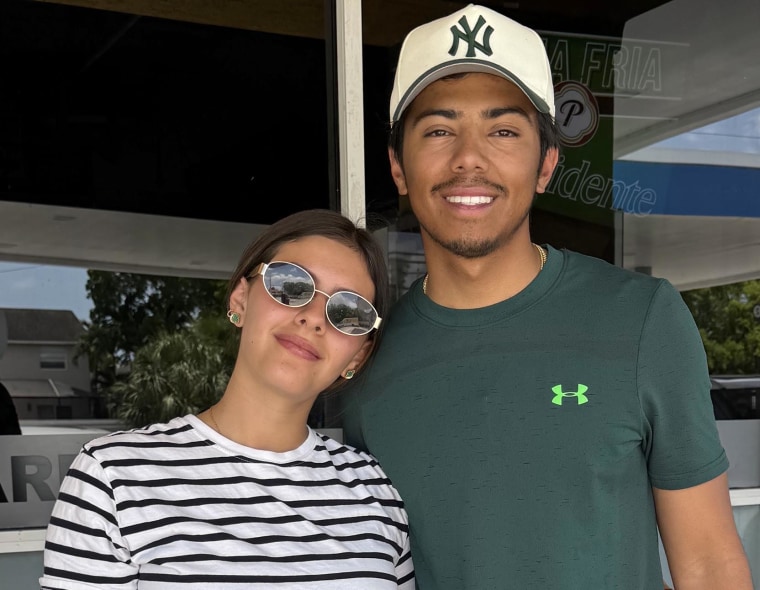MIAMI — After four months with President Donald Trump at the helm, Reinerio de la Torre says he’s waiting to see if the president fulfills his promises.
The 56-year-old electrician, who came from Cuba 18 years ago, voted for Trump in November. But he says the president has gone too far with immigration, and he doesn’t like to see hardworking people being deported. De la Torre also disagrees with the partial travel ban on Cuba, saying “visas should be decided case by case.”
“But it’s still early in the presidency and we have to give him time to see what he does,” de la Torre said outside Hialeah’s City Hall, where roosters were heard crowing in the background. The street that runs across from it was recently named after the president.
Patricia, 52, who declined to give her last name, echoed de la Torre’s sentiment. “He is deporting innocent people, and I don’t like the tariffs, but maybe at the end it will be for the better,” she said.
About 70% of Cuban Americans living in Florida voted for Trump in the 2024 election, and his support in Hialeah, a working-class city in Miami-Dade County with a robust Cuban American population, was one of the strongest. Trump held a rally here one year before the election and the rise in support he got helped him become the first Republican president to win Miami-Dade County since George H.W. Bush in 1988.

While Trump’s support among Cuban Americans remains strong and few seem to regret their vote, worries over immigration policies have begun to creep up among the multiple voters NBC News spoke to, especially among more recent arrivals.
Cuban Americans began flocking toward Trump in big numbers during his first presidency, as he tightened U.S. sanctions against Cuba, banning flights to most of the island and restricting remittances. A hard-line policy is welcomed by many Cuban Americans who fled the communist-run island.
A historic wave has brought well over half a million of Cuban migrants to the U.S. since 2022. Cubans had long been allowed to become U.S. residents fairly easily through the Cuban Adjustment Act, but now Trump’s immigration policies have left some Cuban immigrants in legal limbo.
Trump also revoked the legal status of migrants who entered the U.S. through the Biden-era CBP One app, which temporarily allowed migrants to live in the U.S., and ended the parole program that gave temporary legal status to 532,000 Cubans, Haitians, Nicaraguans and Venezuelans.
While the U.S. has been deporting Cubans regularly since 2017, some recent deportations have surprised some. News of families being separated or a former political prisoner’s parole being revoked have alarmed some in the community.
Trump administration’s partial travel ban on Cuba now makes it impossible for Cubans to gain a visa to visit family, something that was already cumbersome since the U.S. stopped processing visas at the Havana embassy in 2017. For most visas, Cubans had to travel to a third country, often Guyana, which is out of reach for most Cubans.
But Cuban Americans voted for Trump for more than hard-line policies against Cuba, and most seemed content with his presidency thus far.
Mirta Marino, 78, a retired bank worker, said, “Trump is making tough policy decisions, but they are necessary to fix the country.”
She said many Cubans come to this country claiming political persecution but frequently visit the island after they become U.S. residents. Marino, who came in 1980 during the Mariel boatlift, said she never returned. She also believes some people come to this country and take advantage of benefits without working.
A few miles away in the city of Doral, known for its concentration of Venezuelans, many patrons at the popular El Arepazo restaurant are still firmly supporting Trump as well.

Rodrigo Torres, 22, a business owner, said he feels bad for all the Venezuelans affected by Trump’s immigration policies, but he said it helps to get the criminals out of the country.
About half of the people deported in February did not have criminal records and more than half of those in ICE detention have no criminal charges or convictions, according to ICE data.
“There are people getting deported for no reason,” Torres said. “But I would still vote for Trump over Harris.”
Like in Hialeah, a solid majority in Doral voted for Trump in 2024. The city is home to one of the president’s resorts, where he held events and rallies before the election.
Venezuelans may be the group most impacted by Trump’s immigration policies. Since he was campaigning, Trump regularly talked about Venezuelan gangs in the U.S.
“They’re sending us our criminals from Caracas, Venezuela,” Trump said at a July 2024 rally in Doral, claiming Venezuela had sent “all of their drug dealers, their criminals, and most of their prisoners into our country.”
Once in office, Trump used an 18th-century wartime law to send hundreds of Venezuelan immigrants to a maximum security prison in El Salvador, alleging they had ties to the gang Tren de Aragua — something many of the migrants’ families and attorneys have disputed. The men have not been allowed to disprove any gang affiliation or contact attorneys or families. Trump also revoked special legal protections known as Temporary Protected Status for about 350,000 Venezuelans who had been living and working legally in the U.S.
Outside El Arepazo, Carolina Villalobo said she did not vote in the presidential election because she is not yet a citizen, but said she never liked Trump.
“He is very aggressive,” she said. “I agree the country has to be cleaned out and the criminals should be deported, but it should be done with more tact.”
But among her extended family, including siblings and nephews, she’s alone.
“My entire family continues supporting Trump,” Villalobo said.
‘They certainly are feeling the pressure’
The firm support for Trump in South Florida is not surprising to Fernand Amandi, a Democratic consultant and pollster in Miami.
“I haven’t seen a single person who voted for Trump in November of 2024 come out and say: I made a mistake,” he said. “What I have seen is a tremendous amount of rationalization, justification and unwillingness to admit that their votes have contributed to this situation that is now impacting a lot of families and a lot of people directly.”
In order to have a substantial number of voters change their minds, Amandi said, there would have to be a situation in which the economy hits rock bottom and it’s personally affecting them.
Regardless, Democrats are already taking jabs at Republican lawmakers in South Florida that are up for re-election in November 2026. Recently, a group called Keep Them Honest launched an ad campaign on Miami highways and radio criticizing Republican Reps. Mario Díaz-Balart, Carlos Giménez and Maria Elvira Salazar over their support for Trump.
Salazar has been publicly critical about some of Trump’s immigration policies and all three lawmakers have a meeting scheduled with Secretary of Homeland Security Kristi Noem this week.
“They certainly are feeling pressure, they certainly are feeling some backlash, but I’m not quite sure yet it’s to the point where it has made them feel like they are in existential political danger,” said Amandi of the Florida Republican members of Congress. “We see it in their lack of engagement or confrontation with the Trump administration directly … they’re not criticizing the policies or Trump, saying this is out of control and unacceptable.”

Leave a Reply